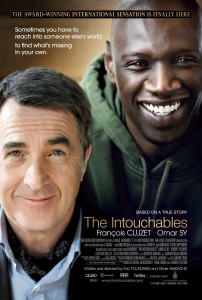The Intouchables (2011)
March 3, 2024 9:08 PM - Subscribe
After he becomes a quadriplegic from a paragliding accident, an aristocrat hires a young man from the projects to be his caregiver.
Dalya Alberge, Guardian, gave it a 4/5:
For once, the hype is justified. This is a charming, uplifting French drama – an irreverent, humorous take on disability, closely drawn from real-life. It focuses on a superficially mismatched friendship between a wealthy quadriplegic and his ex-con carer
76% fresh on Rotten Tomatoes.
Roger Ebert gives a 2.5/4 :
But at the end, by looking through the foreground details, what we're being given is a simplistic reduction of racial stereotypes.
That was also true of "Driving Miss Daisy," but it was a period picture set in the South in the late 1940s, with older characters who had been shaped by their times. There was a plausibility there. "The Intouchables" is more of a soothing fantasy.
Wesley Morris, Boston Globe, gives it a 2/4:
All the white people do in this movie is flatter and spoil and humor Driss. America has a racial-guilt problem. France’s might be more insidious. ... We’re supposed to appreciate the mixing of culture. But this tired little movie got on my last nerve. If Driss is so charismatic and so full of ingenuity, why isn’t he using any of that skill to help lift up his family?
Dalya Alberge, Guardian, gave it a 4/5:
For once, the hype is justified. This is a charming, uplifting French drama – an irreverent, humorous take on disability, closely drawn from real-life. It focuses on a superficially mismatched friendship between a wealthy quadriplegic and his ex-con carer
76% fresh on Rotten Tomatoes.
Roger Ebert gives a 2.5/4 :
But at the end, by looking through the foreground details, what we're being given is a simplistic reduction of racial stereotypes.
That was also true of "Driving Miss Daisy," but it was a period picture set in the South in the late 1940s, with older characters who had been shaped by their times. There was a plausibility there. "The Intouchables" is more of a soothing fantasy.
Wesley Morris, Boston Globe, gives it a 2/4:
All the white people do in this movie is flatter and spoil and humor Driss. America has a racial-guilt problem. France’s might be more insidious. ... We’re supposed to appreciate the mixing of culture. But this tired little movie got on my last nerve. If Driss is so charismatic and so full of ingenuity, why isn’t he using any of that skill to help lift up his family?
You are not logged in, either login or create an account to post comments

But there's a few things I have to imagine the remakes lose in moving the setting -- the high culture of Europe, which comes into focus in several scenes. It's first obviously called out as a marker of class, when Driss and Phillips have dramatically different notions of Berlioz; the composer versus the housing project named after him. But we also see Classical Art described as "the song for that coffee ad" and otherwise juxtaposed in artless places: The Dali print in the delivery business office, the hold music for the Benefits Office. The film mostly just uses these references as a shibboleth test that Driss slowly learns to pass, but I think a better film might have sought a deeper point than "boor learns to appreciate proper music and art."
They had all the trappings to say something worthwhile, but as best I can tell, the painting sequence concludes that it's a scam. We have the scene where Phillippe explains that art is the "trace of our passage on earth." There's a deleted scene where Driss tries it on the redhead love interest, and fails. That scene could have offered a second opinion, and would have given poor Audrey Fleurot's character some central purpose other than a gay punchline. Then Driss could have found his own. Maybe something like "art is a mirror help up to our souls" or something heady.
posted by pwnguin at 10:17 PM on March 3, 2024